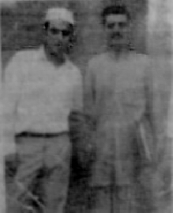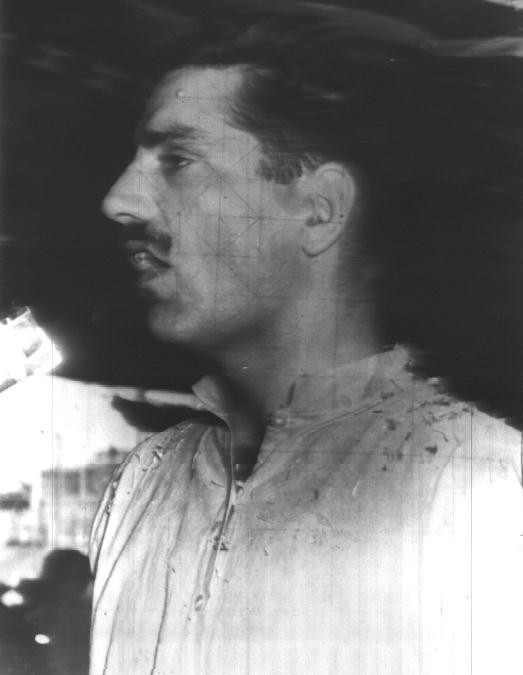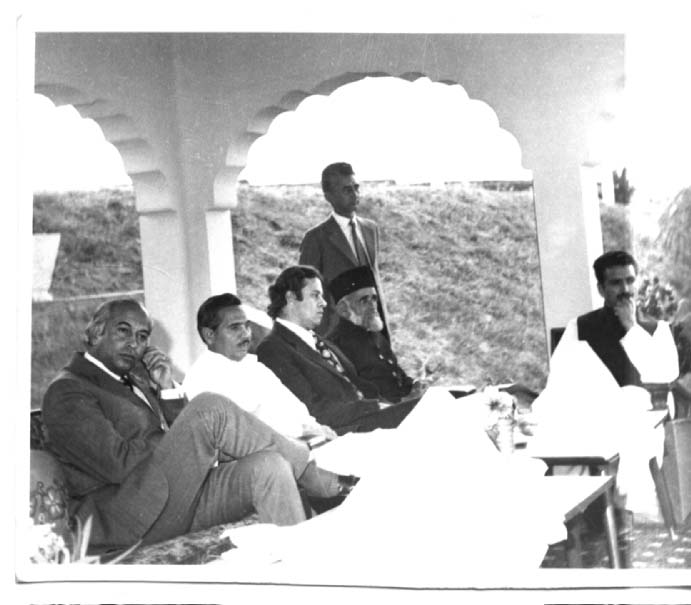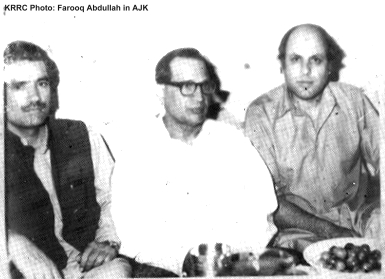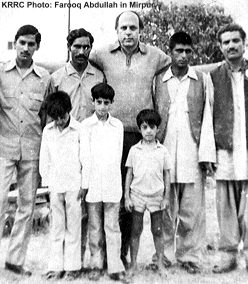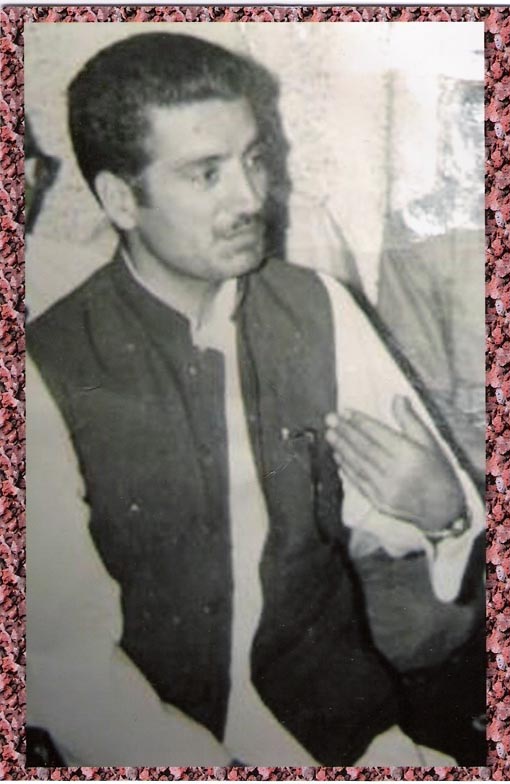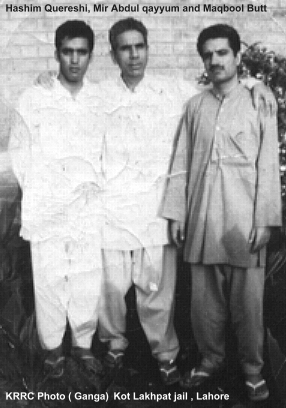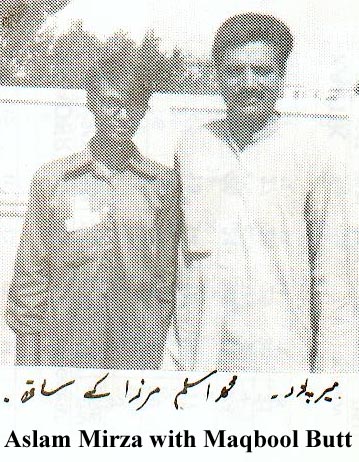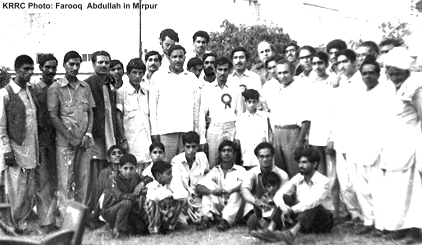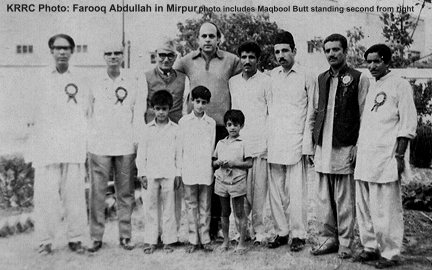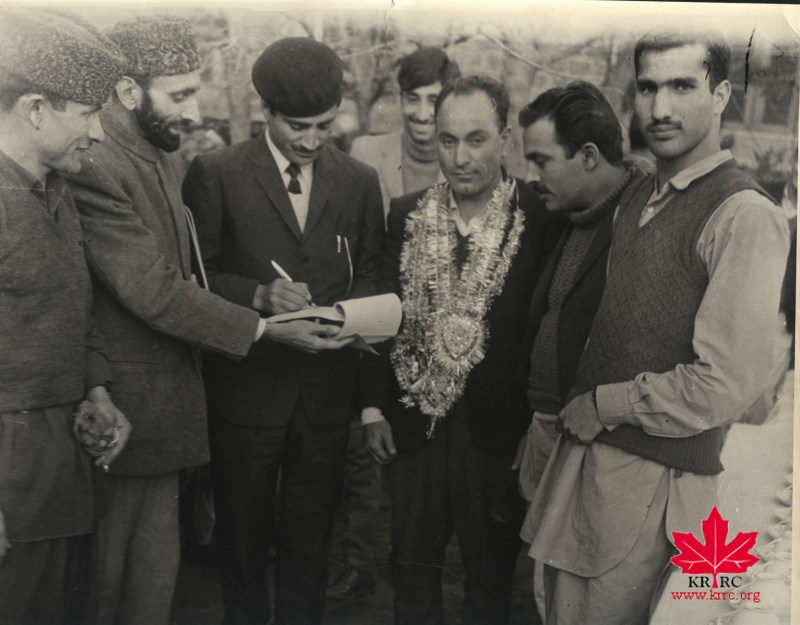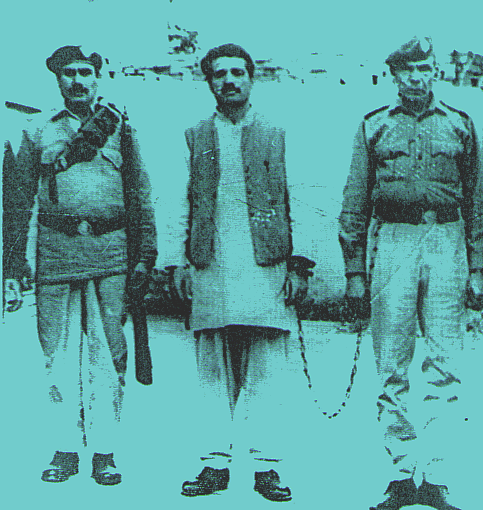11th February 2014 marks the 30th year of the execution and ‘post-execution imprisonment’ of Maqbool Bhatt who during the life course of his political struggle was tried, imprisoned and tortured several times as a ‘Pakistani Agent’ by the Indian and as an ‘Indian Agent’ by the Pakistani rulers. He himself stated before the Indian and Pakistani courts that he was not an ‘Agent’ of one or the other occupier in his motherland but an agent of the freedom of Kashmir and Kashmiri people. Before an Indian court where he was tried under the charges of ‘enemy agent’ he said:
‘‘I have no problem in accepting the charges brought against me except with one correction. I am not an enemy agent but the enemy, enemy of the Indian state occupation in Kashmir. Have a good look at me and recognise me full well, I am the enemy of your illegal rule in Kashmir”.
Three decades and over one hundred thousand lives after his execution, most of the Kashmiris in and out side of the divided state and of all political persuasions revere him as ‘Father of the Nation’, ‘The Great Martyr’ and ‘the most inspiring icon of the ‘national liberation movement’.
Like every year since 1984, Kashmiris across the division line and amongst diaspora are commemorating his martyrdom by organising public gatherings and writing prose and poetry about Maqbool Bhatt despite constant campaigns by the Indian and Pakistani media and intelligentsia to undermine and malign him as an ordinary criminal. In Britain where a large Kashmiri diaspora is settled several events have been announced including a public meeting on 09th February in Bradford, on 11th February in Leeds, 16th February in Luton and 22nd February in Rochdale. On 11th February a demonstration will also be staged outside of the Indian embassy in London. Special public meetings are going to be held in different countries across Europe as well as Middle East, USA and Canada where a sizeable Kashmiris are settled. There are surely going to be series of activities held across the ‘Line of Division’ in Kashmir.
Drawing on the speeches, interviews, letters, and court statements of Maqbool Bhatt compiled in Urdu by Mohammed Rafiq Khwaja and Mohammed Saeed Asad, this article aims to inform the general English reading readers of the life and struggle of the founding father of national liberation struggle and a catalyst for the post-division history of Kashmiri independence politics.
Birth and Childhood
Maqbool Bhatt was born on 18th February 1938 to a peasant family in Trahagam village Tehsil Handwara, district Kupwara. His father was called Ghulam Qadar Bhatt. His mother died when Maqbool Bhatt was 11 years old pupil in the village’s primary (junior) school. He had a younger brother Gulam Nabi Bhatt. Ghulam Qadar had two more sons, Manzoor Ahmed Bhatt and Zahoor Ahmed Bhatt and three daughters from second marriage. The early years of Maqbool Bhatt’s life, like thousands of other Kashmiri children were shaped by the harsh living conditions that characterised the life of peasants at this juncture of Kashmir history.
It was the feudal system in the Maharaja’s Kashmir that forced Maqbool Bhatt to participate in the first political action in his life long struggle against suppression, occupation and for equality, freedom and social justice. Telling this story on 12 April 1972 from Camp Prison Lahore in a letter written to Azra Mir, the daughter of veteran Kashmiri political activist and intellectual, G.M. Mir who was in prison with Maqbool Bhatt in relation to the hijacking of an Indian plane ‘Ganaga’, Maqbool Bhatt wrote:
“It was 1945 or 1946 when I was eight or nine years old child. At this time Kashmir was ruled by a Dogra Family and the entire Kashmiri nation was living a life of slavery. One of the many forms of slavery is called feudalism. The feudalism gets established when the king allocates pieces of land to few people. Because of them being loyal to the king and their help in suppressing and oppressing the riyahaya (subjects), they are made owner of large landholdings for their services. These landholdings are called their jagirs; estates. The Jagirdars; feudals neither plough nor sow these lands. They insert no labour in the land. Ploughing, sowing and harvesting the crops are the jobs of the kisans; peasant. All Jagirdar does is to appear in the fields at the harvest times and take most of the produce away leaving bare minimum for the kisans. The Dogra rulers also had appointed jagirdars in our country. The peasants did all the labour but the lands and their produce belonged to the jagirdars. The owner of our village land was a Jagirdar called Dewan. Although we never saw him but his agents who were called Kardars (literally mean ‘making others work) used to collect grains and fruits from the peasants. The year this incident happened most of the crops were destroyed due to the bad weather. Therefore the produce was next to nothing. Because of the low produce the peasants were not able to provide the jagirdar as much anaj;grains as they used to provide previously. On this the Kardars of Jagirdar started harassing and beating up the peasants in the entire region. They raided the houses and grain stores of the poor peasants and lashed them (to see if the peasants had hidden any of the produce). But what did they have to give to Jagirdar? When the required amount of grains could not be collected the Jagirdar himself came to our village in his motorcar. This was the first time that a motorcar came to our village and we were really excited to see it. The peasants of our village got together and pleaded before the jagirdar for some concessions. They told him in details the reasons for low production. But he was not prepared to believe the peasants. He was persistent that, what come may, even if the children of peasants had to go hungry, his share of grains must be arranged. He ordered his agents, kardars to complete the collection at any cost. The Kardars knew well that peasants did not have anything left to give to Jagirdar but how could they deviate from his orders? At the time when Jagirdar was about to get in his car after issuing the instructions, all the village children were told to lie down in front of the jagirdar’s motorcar. The Kardars were part of this plan. Therefore when hundreds of children thrown themselves down in front of the jagirdar’s car he was pleaded either to stop the further collection of grains or crush these starved and naked children under his car. I was also amongst these children and have fresh in my memories, the images and sounds and massive hue and cry of that day. The children as well as elders, all were crying knowing that once the jagirdar left the village without waiving off the collections, peasants will have to face the qiyamat; the day of judgement like situation. At last the jagirdar gave in to the screaming shrieking of the naked and hunger worn yellowish children agreed to make some concessions.
Not too long after this incident Maqbool Bhatt found himself at the centre of another ‘political’ action against the institutionalised inequality. While the land was granted to the tiller soon after the rise of Sheikh Abdullah to power in 1949, many practices of inequality carried on. One of the most explicit manifestations of the class and status based inequalities was observed in the annual award ceremonies in the schools. Here the rich children and their parents sat on one side and poor on the other side of the hall. One year when Maqbool Bhatt was also amongst the high achievers he refused to receive the award unless the seating arrangement was changed. He said that all the children should sit together on one side and all the parents on the other. As a result the suggestion was accepted and since then it was made a norm in this village school. While still in school Maqbool Bhatt also successfully led the campaign for promoting this school from primary to secondary status.
Further Education
After his secondary school certificate, Maqbool Bhatt moved to St. Joseph College in Baramula. This was a private missionary college. Here he gained his first degree (BA) in history and political science.
Answering to a question about his college days from 1954 to 1958, in an interview with weekly ‘Zindgi’ (life) following the Ganga Hijacking in 1971, Maqbool Bhatt said:
“I was a good speaker. Used to do lots of strikes. Like most of Kashmiri citizens we also had great interest in Plebiscite Front. From the start we had a clear aim before us. One benefit of our strikes in college was that the government took over the control of the college”.
Khawaja Rafiq in his ‘Safeer e Hurriyat’ (the ambassador of liberation) writes that listening to the passionate and fiery speeches of Maqbool Bhatt, the college principle Father George Shanks said:
“This Youngman, if managed to pass through the hardships, will become a great man. But people of these tendencies usually face extreme difficulties in the society. For the type of freedom they dream of is extremely hard to achieve. Subsequently, they get sacrificed on their way to freedom”.
Crossing the Divide
The journey on that road to great sacrifices for Maqbool Bhatt was started while still a student at St. Joseph College. Responding to a question about crossing over to Pakistan in the above interview that was recorded in room number 26 of Mujahid Hotel International, Maqbool Bhatt said:
In December 1957 the release of the lion of Kashmir (Sheikh Abdullah) initiated a chain of agitational activities. I had my B.A exams in March/April that year. The examination centre was in Srinagar. The arrests of freedom fighters were also started at the same time. My last exam was on 2nd of April and Sheikh was rearrested on 27th. Student activists were chased and arrested. I was also an obvious target. Therefore, I went underground. After three months when the result came, I asked my father to go and bring the ‘temporary certificate’. Then we came to Pakistan in August 1958. First we came to Lahore but then in September 1958 settled in Peshawar.
According to Khawaja, R. (1997), on this journey that changed his life course forever Maqbool Bhatt was accompanied by his uncle Abdul Aziz Bhatt.
In Pakistan
First and foremost problem before Maqbool Bhatt in Pakistan was to continue his education and at the same time find a job to meet the expenses. For with out that
“it was hard to live in Pakistan’. Therefore, I joined ’Injam’ (end/conclusion/performance), a weekly magazine, as sub-editor and started my working life as a journalist. I did my MA (from Pehswar university) in Urdu literature and worked with ‘Anjam’ till the start of full time politics in 1965 (Khawaja, 1997).
Meanwhile his marriage was arranged by his uncle with a Kashmiri woman Raja Begum in 1961. He had two sons from this wife, Javed Maqbool born in 1962 and Shaukat Maqbool in 1964. In 1966 he married to his second wife, Zakra Begum, a school teacher and had a daughter Lubna Maqbool with her.
Politics
In 1961 Maqbool Bhatt contested the Kashmiri diaspora seat from Pehsawar, Pakistan in the ‘Basic Democracy’ elections introduced by the then president of ‘Azad’ Kashmir, Khurshid Hassan Khurshid, commonly known as K.H. Khurshid. Soon after that he campaigned for K.H. Khurshid in presidential elections and for GM. Lone in the Kashmir State council elections. Both of the candidates came out victorious on their respective seats. But when Pakistan started the operation Gibraltar by sending militants across the Indian occupied Kashmir to capture Kashmir, Maqbool Bhatt said farewell to the ‘election’ politics and offered his services to fight along with the Pakistani authorities but his offer was rejected. This incident had profound impacts on the political approach of Maqbool Bhatt.
At this point there existed in Pakistan a ‘Kashmir Independence Committee’ (KIC) formed on 12th May 1963 by Amanulla Khan along with several middle class Kashmiri diaspora activists including journalists, students, businessmen and lawyers in reactions to the rumours that the Pakistani and Indian foreign ministers were to agree on dividing Kashmir on communal basis. The committee was headed by the Kashmir State Council member GM Lone who few years back Maqbool Bhatt campaigned for. After the end of India Pakistan talks without any conclusion the committee also became inactive.
Meanwhile inside ‘Azad’ Kashmiri a ‘United Front’ of various political groups, voluntary organisations, shopkeepers associations and intellectuals got together to resist the construction of Mangla Dam paved the way for pro-independence politics. In April 1965 the political activists from ‘Azad’ Kashmir and members of KIC got together and crossed into Suchetgarh, a Kashmiri village inside the Indian occupied areas of Kashmir near the Pakistani city of Sialkot, and formed the ‘Jammu Kashmir Plebiscite Front, the PF. Maqbool Bhatt was elected as Publicity Secretary for this first pro-independence political organisation of some significance in ‘Azad Kashmir’ that later gave birth to most of the pro-independence groups including Jammu Kashmir National Liberation Front (NLF) headed by Maqbool Bhatt and Jammu Kashmir Liberation Front (Britain) led first by Abdul Jabbar Bhatt and later by Amanullah Khan and Yasin Malik. Mr Abdul Khaliq Ansari, the veteran pro independence voice in ‘Azad’ Kashmir, and Amanullah Khan were elected president and general secretary of PF respectively.
This was the time when several national liberation struggles were echoed across the world. Maqbool Bhatt along with many PF Kashmiris was also very much inspired by these struggles particularly those in Algeria, Palestine and Vietnam. According to Amanullah Khan, a proposal to adopt armed struggle as an objective of Plebiscite Front was presented before the working party meeting of PF on 12th July 1965 in Mirpur but was defeated. However, Maqbool Bhatt, Amanullah Khan, Mir Abudl Qayyum, a Kashmiri migrant settled in Pakistan running a successful carpet business, and Major (R) Amanullah from Highhama town of Kashmir who fought in the world war and served in the Indian National Army of Subash Chandar Bose and also participated in the Azad Kashmir war of 1947, secretly formed ‘The Jammu Kashmir National Liberation Front’ (NLF) on 13th August 1965 at the residence of Major Amanullah in Peshawar. The aim of this organisation was written down as engaging in:
“all forms of struggle including armed struggle to enable the people of Jammu Kashmir State to determine the future of the State as the sole owners of their motherland” (Khan, 1992, p.112).
Crossing Back
For the next ten months the group of four recruited more people into the ranks of NLF including GM Lone (the vice president of PF) and on 10th June 1966 the first group of NLF members secretly crossed over to the Indian occupied Kashmir. Maqbool Bhatt, Aurangzeb, a student from Gilgit, Amir Ahmed and Kala Khan, a retired subedar (non-commissioned officer from AJK force) went deep into Valley while Major Amanullah and Subedar Habibullah remained near to the division line. The former were to recruit Kashmiris in the IOK into NLF while the later were responsible for training and weapon supply. Maqbool Bhatt along with three of his group members worked underground for three months and established several gorilla cells in IOK.
However, after about three months the Indian intelligence services found out about the underground activities and started a big operation to capture these activists. In an encounter with the soldiers one of the NLF members Aurganzeb from Gilgit got killed and Kala Khan received injuries. Eventually Maqbool Bhatt and two of his comrades, Kala Khan and Amir Ahmed were arrested. They were tried as enemy agents. Commenting on this incident later Maqbool Bhatt said that this was not a staged operation.
“We were still in organisational phase and were not fully prepared for taking the risk of clashing with authorities. The risk of clash should only be taken when you are able to invite the enemy for that. We were arrested and tried. The government of the occupied Kashmir wanted the case to be dealt in a military court and finish us off. But the case was heard in civil court for two years. The verdict was given in August 1968. We were three people in total. Two were given death (Maqbool Bhatt and Amir Ahmed) and one (Kala Khan) life sentences. Our comrades from the occupied Kashmir were given from three months to three years. Nearly three hundred people were arrested including students, engineers, teachers, contractors, shopkeepers and government employees. They belonged to all parties including Plebiscite Front, Congress, and National Conference etc. (Khawaja op. cit. p.248).
Escape from Prison
Soon they started planning escape from the prison and within a month and half managed to escape from the prison in Srinagar. Maqbool Bhatt later wrote in great detail about the escape and submitted that before the Special Trial Court in Pakistant where he was tried along with other NLF members for ‘Ganga’ hijacking. However, only a brief account of this ‘great escape’ is included here from one of his interviews:
“On 22nd October 1968 we started planning to escape from the prison and after one and a half month of intense planning we managed to put this plan to practice on 8th December 1968 at 2:10 am by breaking the prison wall. Two of us were on death sentence and the third one with us was a prisoner from Azad Kashmir. It took us 16 days to reach to the first border check post of Azad Kashmir. We reached to Muzaffarabad on 25th December and were interrogated in the interrogation centre of Muzaffarabad till March 1969”.
Answering a question about their arrest in Azad Kashmir, Maqbool Bhatt said:
“What can I say about that? It was the government of Ayub Khan (in Pakistan) and what can I say about Ayub Khan. This man neither had the welfare of the Pakistani people at his heart nor of the Kashmiris. His government been very cruel to us. I was severely tortured while in the concentration camp. The pain increased with the thoughts that it was inflicted by our own (Khawaja op. cit. p249).
They were released on 8th March 1969 when PF, NLF and National Students Federation (NSF) activists staged series of demonstrations in Islamabad. In November 1969 the annual convention of Plebiscite Front was held in Muzaffarabad where Maqbool Bhatt was elected its president.
While recognising the setback caused by the premature exposure of NLF in the IOK, Maqbool Bhatt was of the opinion that it inspired and motivated more Kashmiris to join the armed struggle:
“Now we have entered in a new phase. Not only are we able to speak in the language of power that is the only language India understands but also are able to make the world community, which has ignored our existence, to recognise us. In this world you have to have your existence recognised. We have our existence recognised and we will rest only when the existence of the entire Kashmiri nation is recognised, Inshallah” (op. cit.)
After being elected as the president of PF, Maqbool Bhatt spent next few years in campaigning for the political rights in Gilgit Baltistan and ‘Azad’ Kashmir. The focus of campaign on this side was against the puppet status of Azad Kashmir and such controlling institutions as the Ministry of Kashmir Affairs and Chief Secretary Office. With Gilgit Baltistan the situation was even worse. These parts of the State were directly controlled by Pakistan through a political agent. The PF launched a week long activities to highlight this situation and announced that next convention of PF will be held in G&B. During this week PF activists including Maqbool Bhatt, Khaliq Ansari, Mir Qayyum, Amanullah Khan and GM Mir were arrested and forcefully exiled from the State boundaries.
The Ganga Hijacking
The event that brought Kashmir Issue to the attention of the world and lime lighted Maqbool was the hijacking of an Indian Fokker plane ‘Ganga’. There are several official and common theories about the background and impacts of this hijacking. However, only a brief account can be included in the scope of this article.
Ganga, an Indian airliner was hijacked on 30 January 1971 at 1305 hours while on its routine flight from Srinagar to Jammu. In total it was carrying 30 people including four crew members. The Hijackers were two Sringar boys Hashim and Ashraf Qureshi both in their late teens. They brought the plane to Lahore airport and demanded the release of about two dozen political prisoners of NLF in the Indian prisons. On 1st February 1971 all the passengers and crew were released and sent back to India via Amritsar and the ‘Ganga’ was set on fire. This incident was later used by India to suspend the over flights to East Pakistan of Pakistani aircrafts over Indian Territory (Lamb, 1991, p.289). The situation later led to the 1971 war between India and Pakistan and the creation of Bangladesh. The hijackers and Maqbool Bhatt under whose instructions hijackers said the hijacking was carried out were initially praised as heroes but then suddenly they along with hundreds of NLF activists were arrested and interrogated in Shahee Qila (Royal Forte) Lahore and ‘Dulahee Camp’ Muzafrabad. Details of the interrogation can be found in the recently published book by the Institute of Kashmir Studies Mirpur, ‘Devwanoon Pe Kiya Guazari’ (What the Devotees been through).
Six of the prisoners including Maqbool Bhatt, G.M. Lone, Mir Abdul Qayyum, Mir Abdul Manan and the two hijackers Hashim Qureshi and Ashraf Qureshi were later tried in a Special Court of Pakistan under the charges of collaboration with the Indian intelligence services.
According to Khawaja (p.132) Maqbool Bhatt was charged under the ‘Enemy Act 1943’ of the Indian Penal Code. Only a few years earlier he was tried under the same colonial Act by the Indian Government in the Indian Occupied Kashmir. The case started in December 1971 and after a long trial in which 1984 prosecuting and 1942 defence witnessed were called in was concluded in May 1973. All but Hashim Qureshi were cleared of all charges other than dealing with arms and explosives etc. Hashmim Qureshi was sentenced for fourteen years imprisonment. The long statement Maqbool Bhatt submitted for this case is perhaps the most detailed reflection on his political ideology. While it cannot be incorporated in full, a brief quote from this statement would not be out of place here:
“I can say without any hesitation that I have not designed any conspiracy nor have I been a part of any group of conspirers. My character has always been transparent and unambiguous. However, I have done one thing and that is the rebellion against ignorance, greed of wealth, exploitation, oppression, slavery and hypocrisy. If the ruling class of Pakistan that is a product of imperialism and represented by the bureaucracy and military dictatorship of this country views this as conspiracy then I have no hesitation in accepting the charge”.
It will be interesting to note here that Ganga Case was carried out under special presidential orders of the then president of Pakistan Yaha Yaha Khan according to which the accused were denied the right to appeal against the decision of this Special Court. Despite many requests and protests in Azad Kashmir and Pakistan the right to appeal for Ganga accused was not accepted. According to Mir Qayyum, in a conversation with the founding president of PF and veteran Kashmiri independence activist Abdul Khaliq Ansari who is also a renowned lawyer in ‘Azad Kashmir’, the then law minister of Pakistan Mehmood Ali Qasuri said:
‘Where in the world do you have the right to appeal against the Supreme Court decision?’
In response Khaliq Ansari asked:
‘And where in the world the Supreme Court has ever been used as ‘Trial Court’?
According to Mir Abdul Qayyum, the right to appeal was restored only after the British Kashmiris warned several Pakistani ministers on their visits to Britain that the unlawful tactics of the Pakistani rulers to convict these Kashmiris will be exposed (Mir Qayyum, unpublished documents of NLF). Using this right, the NLF filed an appeal against the Special Court’s decision about Hashim Quereshi. But it took seven years before this appeal was heard at Supreme Court where Hashim was also cleared (Khawaja op. cit. p.151).
In terms of Kashmir, the ‘Ganga’ trial had many far reaching affects on the NLF and on the wider independence politics. Firstly it affectively paralysed NLF that lost many members due to physical torture, psychological pressure and financial losses. Many also became disillusioned and disappointed due to various misunderstandings that were developed between the leadership during the course of trial. Maqbool Bhatt however continued his efforts to reorganise the struggle in both the armed and political fields. In 1975 the PF decided to participate in the elections held under the Bhutto’s Peoples Party Government. Maqbool Bhatt who at this point had no office responsibility in PF also contested the election. All PF candidates, including Maqbool Bhatt, lost to PPP candidates. The PF commentators claim that the result had a lot to do with massive vote riggings in favour of PPP candidates.
The Last Crossing
With NLF dismantled and PF demoralised, Maqbool Bhatt once again crossed over to the Indian occupied Kashmir against the advice of many of his friends and comrades in May 1976. This time he went with Abdul Hamid Bhatt and Riaz Dar. Within few days of crossing they were spotted and arrested by the Indian forces. In 1978 the Indian Supreme Court restored death sentence on Maqbool Bhatt and he was transferred to Delhi’s Tihaar Prison. After eight long years in prison Maqbool Bhatt was hanged on 11th February 1984 while the legal team was waiting for the case to be reopened on the grounds of flaws in the trial that convicted Maqbool Bhatt of murder. His execution was carried out in haste to avenge the killing of an Indian diplomat in Birmingham by an unknown group ‘Kashmir Liberation Army’. Rovendra Mahatre was kidnapped in the first week of February 1984 from his Birmingham office by KLA who demanded among other things the release of Maqbool Bhatt. Thus was ended the life of one of the greatest revolutionaries of modern Kashmiri history and was born what Kashmiris remember as Shaheed e Azam (the greatest martyr). Ironically, death warrants of Maqbool Bhatt were signed by Dr Farooq Abdullah the then Chief Minister of IOK who spent several days with Maqbool Bhatt in ‘Azad’ Kashmir and Pakistan in 1974 and who said later that ‘I have found Maqbool Bhatt a very romantic man, just like Che Guevara’. He could have added ‘like Shiekh Abdullah in 1930s’, whose politics initially inspired Maqbool Bhatt as a student at St Joseph College.
An Imprisoned Martyr in the world’s largest democracy
India is acclaimed by the democratic world as the largest democracy on earth. While there is no doubt that democratic traditions and institutions in India are far more established, when it comes to Kashmir India is no more than an occupier and oppressive state that rules Kashmir through colonial like structures and authoritarian means with little regards for the democratic values, human rights and civil liberties. This neo-colonial face of Indian rule in Kashmir was demonstrated in its worst form in the way Maqbool Bhatt was hanged and what followed.
Not only that Maqbool Bhatt was executed in revenge, no one even the family members were allowed to see him before execution and after execution he was buried inside the prison premises. Maqbool Bhatt’s sister says:
‘we went at the Srinagar airport to catch flight for Delhi but the police did not let us go’. His niece tells ‘they did not return any of his belongings from Thiar’. I wish they let us have some soil from his grave in the prison’ (www.rediff.com)
Mohammed Yasin Bhatt another Kashmiri who was imprisoned in Tihar for his involvement in freedom struggle wrote to ‘Kashmir Times’ Britain in 1995 that during his time in Tihar prison he spoke to several prisoners and prison staff about Maqbool Bhatt. They all remember him with great respect for his dignified behaviour and for his struggle in prison for the rights of prisoners and the lower rank prison staff. He further wrote:
“Maqbool Sahib’s grave is the only one in Tihar prison which has a wall built around it by the prisoners. Every month prison staff cleans it and prisoners light fragrant candles on it and pray for him according to their own faiths”.
Despite the confidence building measures and ceasefire between the Indian and Pakistani armies in Kashmir the repeated demands by Kashmiris for the return of Maqbool Bhatt’s remains are not responded to and this icon of Kashmiri liberation struggle is kept in prison even 28 years after his execution. The only other example of this kind of disregard for human rights of political activists comes to mind is that of Baghat Singh, Sukh Dev and Raj Guru whose bodies were also not returned to their families by the British colonial authorities after execution in 1930s.
Iftikhar Gilani, a Delhi based Kashmiri journalist who spent ten months in Tihar orison in 2004 wrote in his book that Maqbool Bhatt’s grave in prison has been built over. However, a campaign for the release of Maqboll Bhatt’s mortal remains is gradually growing. There are two graves waiting for the body of Maqbool Bhatt. One in the martyrs’ cemetery in Srinagar’s old Eidgah district where its tombstone has inscription in green Urdu letters that read “this is where Shaeed e Azam[ (the greatest martyr) Maqbool Bhatt will one day be laid to rest’. Another grave for Maqbool Bhatt is between the graves of his brothers in the courtyard of the house where he was born in Trahagam.
Recently Mabool Bhatt’s mother has joined the campaign for the release of Maqbool Bhatt’s remains from Tihar Prison.
This unique situation about the burial of Maqbool Bhatt was nicely depicted by Mohammed Yamin, a Kashmiri poet from ‘Azad’ Kashmir in his poem ‘Roashni Ka Shaeed e Awal’ (the first martyr for the light) that is now juxtaposed on a large portrait of Maqbool Bhatt and hangs on the front room walls of many pro independence Kashmiris across AJK and diaspora from this part of Kashmir.
Kahaan Tu Soya Khabar Nahee
Khabar Nahee Qabar Nahee
Magar yeh bandey nisar terey
Karror dil hein mazar terey
Many do not know where you are buried
There is no news, there is no grave
But for the millions you inspired
You live in their hearts and minds
(Khawaja, 1997, p.6)
The author originally from Mirpur in Pakistani occupied Kashmir settled in Britain since 1988 has written extensively on different aspects of Kashmiri independence politics and diaspora and can be reached through This email address is being protected from spambots. You need JavaScript enabled to view it.


